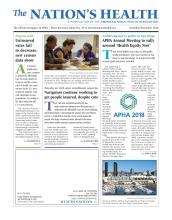Countries around the world are committing to action on tuberculosis, the globe’s leading infectious disease killer, but progress must further advance to reach global targets of ending the epidemic by 2030.
The World Health Organization released the 2018 edition of its global tuberculosis report ahead of the United Nations’ first high-level meeting on tuberculosis on Sept. 26. The latest report shows that tuberculosis deaths have decreased in the past year, with 1.6 million deaths in 2016. However, challenges persist in underreporting and underdiagnosis, treatment coverage, access to care and funding. According to the report:
Just 6.4 million out of the 10 million people infected with tuberculosis in 2017 were officially recorded, with 10 countries making up 80 percent of the reporting gap.
Treatment coverage is at 64 percent and must accelerate to 90 percent by 2025 to meet global targets.
Preventive treatment is particularly critical among vulnerable populations including children under 5 years old in households with tuberculosis and people with HIV.
Investments in tuberculosis prevention and care fell $3.5 billion short in low- and middle-income countries in 2018, and an additional $1.3 billion per year is necessary to develop new vaccines, diagnostics and medicines.
Under the U.N. Sustainable Development Goals and the WHO End TB Strategy, heads of state and government are working to drastically reduce tuberculosis deaths and incidence as well as ensure that affected households do not endure catastrophic costs by 2030.
“We have never seen such high-level political attention and understanding of what the world needs to do to end TB and drug-resistant TB,” WHO Director-General Tedros Adhanom Ghebreyesus said in a news release. “We must capitalize on this new momentum and act together to end this terrible disease.”
WHO, the Stop TB Partnership and the Global Fund to Fight AIDS, Tuberculosis and Malaria have also collaborated on the “Find. Treat. All. #EndTB” initiative, which seeks countries and partners in achieving universal access to tuberculosis care and prevention.
“It is unacceptable that millions lose their lives, and many more suffer daily from this preventable and curable disease,” Tereza Kasaeva, director of WHO’s Global TB Programme, in a news release. “We need to join forces to root out this disease that has a devastating social and economic impact on those who are left behind, whose human rights and dignity are limited, and who struggle to access care. The time for action is now.”
For more information on the “Global Tuberculosis Report 2018,” visit http://www.who.int/tb/publications/global_report/en.
- Copyright The Nation’s Health, American Public Health Association









